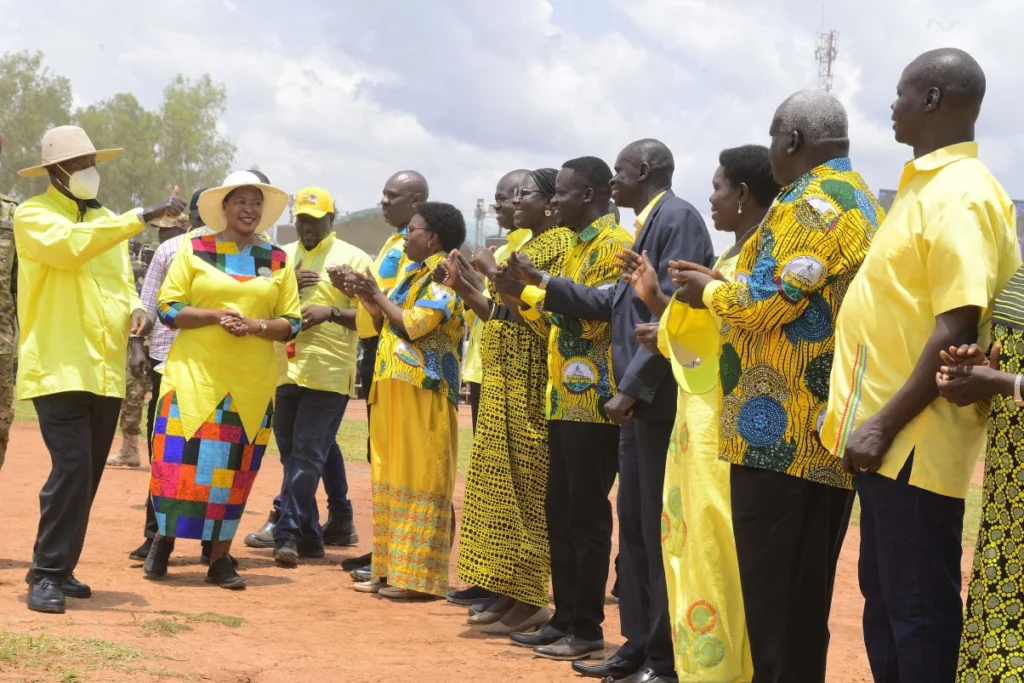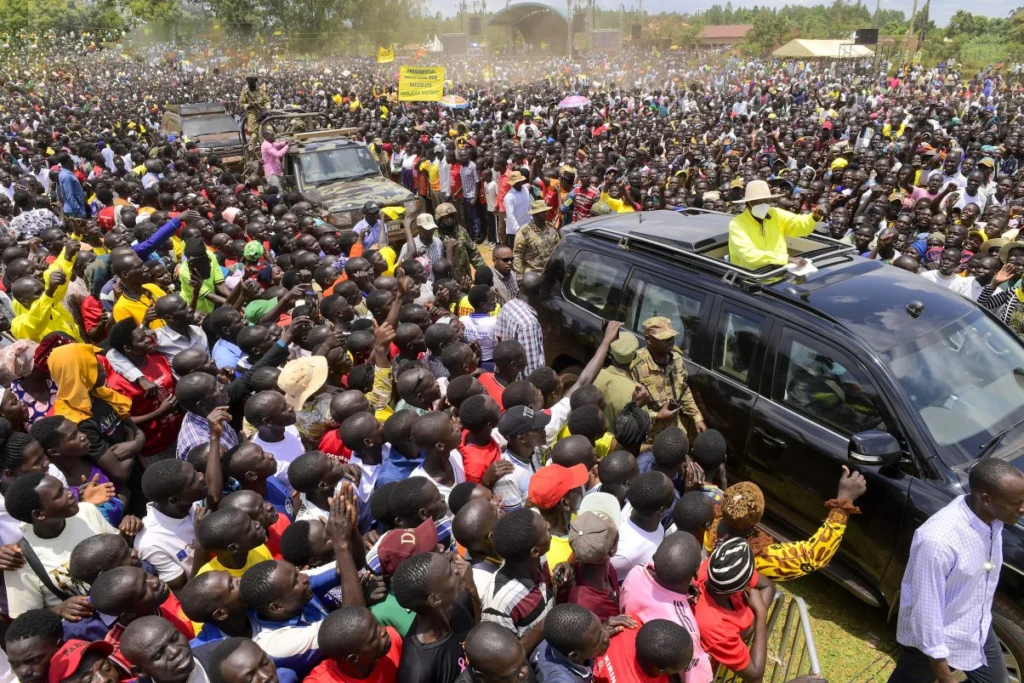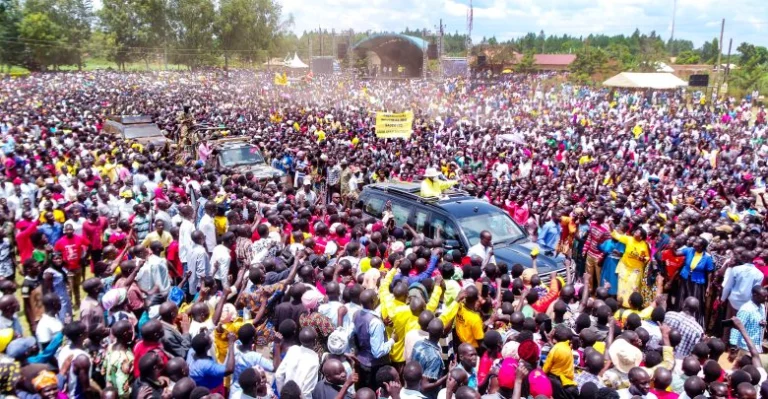AMOLATAR, UGANDA — President Yoweri Kaguta Museveni has vowed to personally create a spy network to catch officials and community leaders accused of stealing government medicines and funds under his flagship Parish Development Model (PDM) program.
The President made the declaration on Wednesday during a high-energy campaign rally in Amolatar District, located in Uganda’s northern Lango sub-region, where he addressed thousands of enthusiastic supporters as part of his 2026 re-election campaign trail.
“Stop Stealing Drugs,” Museveni Warns Officials
Speaking with his trademark bluntness, the 79-year-old leader condemned growing reports of corruption in health centers and local government offices.
“These health centers are not in Congo or Sudan; they are here with us,” Museveni said. “Stop stealing drugs. I will set up my own spy network to catch those stealing government drugs and even PDM money. We cannot allow a few criminals to frustrate the transformation of our people.”
The remarks sparked loud applause from the crowd, many of whom cheered as Museveni promised to root out officials “eating money meant for the poor.”

PDM: The Centerpiece of Uganda’s Anti-Poverty Drive
Launched in 2022, the Parish Development Model (PDM) was designed to channel government funds directly to parishes — the smallest administrative units — to help small-scale farmers and low-income households join the money economy.
Under the initiative, each parish is expected to receive up to Shs 100 million annually for community projects, agricultural development, and small enterprise funding.
However, despite its ambitious goals, the program has faced allegations of corruption, delayed disbursements, and weak oversight — with several reports suggesting funds have been mismanaged or diverted by local leaders and officials.
Museveni’s latest remarks signal his growing frustration with persistent accountability failures in a program he has championed as key to eradicating rural poverty.
Public Outcry Over Misuse of PDM Funds
Across the country, citizens have repeatedly complained about PDM money being misallocated, with some claiming only a few beneficiaries receive full funding while others are left out.
Civil society groups have also raised red flags, warning that without strict supervision, corruption could undermine the program’s impact.
By announcing a personal intelligence network, Museveni appears to be taking a more hands-on approach to tackling what he sees as a sabotage of his economic vision.
Museveni Promises Major Reforms in Education and Skills Training
Beyond anti-corruption measures, Museveni used the rally to unveil a set of sweeping promises targeting Uganda’s education and employment sectors — key concerns ahead of the 2026 elections, where he is seeking a seventh term in office.
Among the pledges:
- Abolishing school charges in all government institutions
- Recruiting 50,000 new teachers to address staffing shortages
- Expanding zonal skilling hubs that train youth in trades such as carpentry, welding, tailoring, and bakery
“We are going to make sure every young person has access to skills that create wealth,” Museveni told supporters. “No one should fail because they cannot afford school fees.”

Economic Push: Fishponds Over Rice Farming
On economic policy, Museveni reiterated his commitment to boosting agro-industrialization and promoting high-value farming models.
He encouraged communities in wetland areas to invest in fishpond farming, arguing that it would generate higher incomes than rice cultivation.
“Fish farming brings in more profit and is environmentally sustainable,” he explained. “We shall support you through government credit facilities.”
Museveni said his administration plans to work closely with local governments to provide inputs, access to credit, and training for youth interested in fisheries and aquaculture.
Northern Uganda to Receive Livestock Compensation
The President also addressed a longstanding grievance in northern Uganda, announcing that families affected by past conflicts would be compensated with five cows each.
The move is aimed at rebuilding livelihoods in a region that endured years of war and displacement during the Lord’s Resistance Army (LRA) insurgency.
“We are going to compensate our people who lost cattle during the war. Every family will get five cows to restore their dignity,” Museveni declared to cheering crowds.
High-Profile Support and Political Endorsements
Several senior government officials joined Museveni at the Amolatar rally, including Speaker of Parliament Anita Among and Government Chief Whip Denis Hamson Obua, both of whom endorsed his 2026 campaign.
Among praised Museveni’s leadership for “protecting the gains of stability and development,” while Obua rallied voters under the campaign slogan:
“Protecting the Gains — Making a Qualitative Leap into High Middle-Income Status.”
Local leaders also reaffirmed their allegiance, with Amolatar District Chairman pledging “100% votes” for the incumbent. Supporters waved banners and danced as Museveni’s convoy rolled through, chanting his name and singing songs praising his leadership.
Analysts Weigh In: Will a Spy Network Work?
While Museveni’s anti-corruption vow drew praise from his supporters, critics and analysts are divided on whether a presidential spy network can effectively solve Uganda’s systemic corruption problem.
Political commentator Charles Rwomushana noted that “corruption thrives in a culture of impunity,” suggesting that the President’s personal intervention might be more symbolic than structural.
Meanwhile, transparency activists are calling for stronger institutional reforms rather than secret surveillance measures, warning that new spy operations could raise privacy and accountability concerns.
Museveni’s Message: Discipline, Transformation, and Trust
Despite skepticism, Museveni’s message in Amolatar was clear — discipline and honesty must be at the heart of Uganda’s transformation journey.
“We cannot allow a few criminals to frustrate the transformation of our people,” he emphasized again, calling on citizens to report corruption wherever they see it.
With the 2026 elections looming, Museveni’s latest campaign speech blended anti-corruption rhetoric, populist promises, and nationalist appeals — signaling a familiar strategy that has long anchored his political brand.
What do you think of Museveni’s plan to use spies to curb corruption? Can it truly stop the theft of government funds? Join the conversation below.





